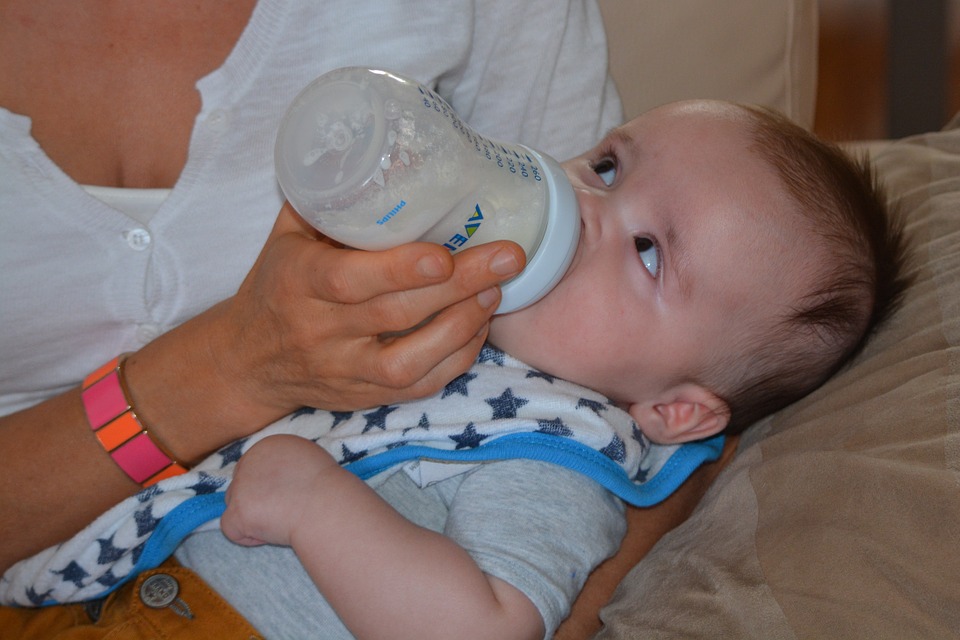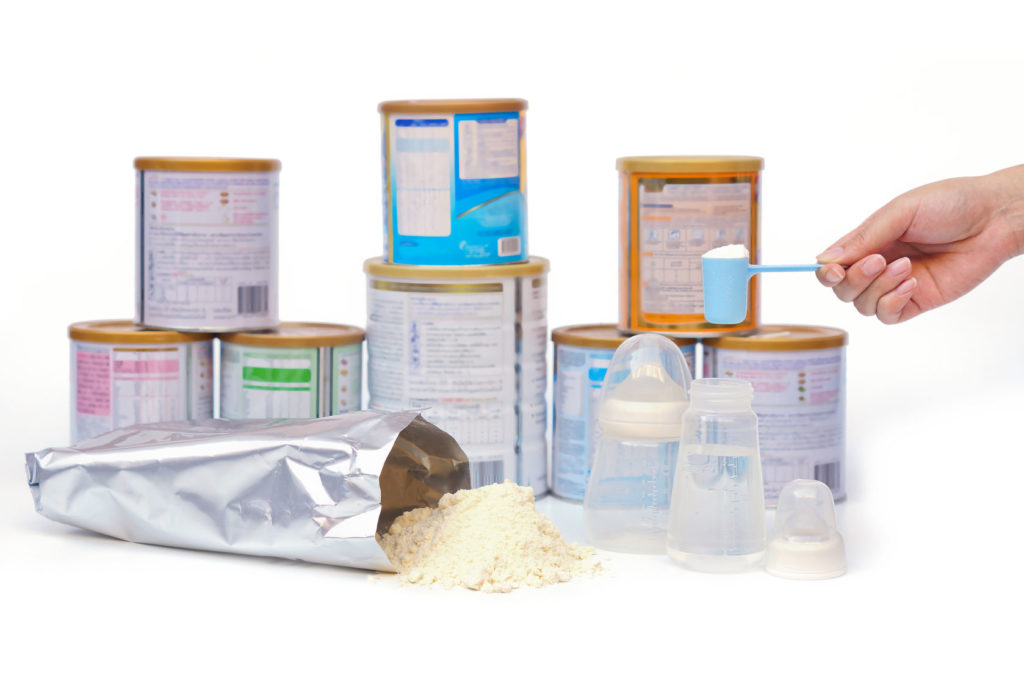 Whether you believe in breastfeeding or bottle-feeding your baby, you will experience no lack of judgmental comments from women who believe in nourishing their babies the other way. Prominent organizations line up on the side of breastfeeding to give kids a healthy start in life, but advertisements from formula manufacturers and some research suggests that bottle-fed babies do just as well.
Whether you believe in breastfeeding or bottle-feeding your baby, you will experience no lack of judgmental comments from women who believe in nourishing their babies the other way. Prominent organizations line up on the side of breastfeeding to give kids a healthy start in life, but advertisements from formula manufacturers and some research suggests that bottle-fed babies do just as well.
Experts Support Breastfeeding
According to obstetrician-gynecologists, pediatricians, and other providers of maternal and child care, mother‘s milk is a perfect food that provides all the nutrients a baby needs for growth. It also helps build the child’s immune system so that some common childhood problems such as your infection and asthma are less likely. In comparison to formula, it is more easily digested, so that it reduces stomach upset and diarrhea.
Even the US government promotes breastfeeding as the ideal for young mothers. The Surgeon General set breastfeeding goals and public health agencies support it. Even the WIC program, which provides formula for mothers who want it, promotes it by offering mothers who are nursing with a broader and more plentiful supply of fruits, vegetables, and meats.

Mothers May Not Agree
A survey of 36,000 readers of Baby Talk magazine in August 2017 show that the division among mothers who want the best for their babies is not going away. Here are some interesting findings from the survey:
- 66% of breast-feeding mothers felt sorry for formula fed babies while 33% claimed bottle feed mothers were selfish and lazy.
- 83% of breast-feeding mothers felt they had been criticized by those who use the bottle, as evidenced by derogatory remarks or disapproving looks when feeding the babies in public
- 92% of formula feeding mothers support breastfeeding; 63% said they had never been criticized by breastfeeding moms. (Little do they know!)
- 66% of women who used formula did so due to convenience, especially if they were going back to work. (Typical maternity leaves are only 6 to 8 weeks, which doesn’t allow much time to get comfortable with breastfeeding. Working mothers claimed that their employers made pumping milk at work difficult.

Breast Vs. Formula
Commercially prepared infant formula in concentrated form became widely available in 1951, while liquid ready-to-feed formula hit the market in 1960. Though breastfeeding for at least the first six months was the norm in the early fifties, by 1958, only 30% of mothers of young infants breastfed their babies. By the 70’s, this figure dropped to 25%.
Rates for breast-feeding versus formula feeding have flip-flopped over the years. The government hoped to have 75% of mothers breast-feeding by 2000. As of 2011, this goal was reached. However, about 80% of infants between 3 and 11 months drink at least some formula. Gone are the days when babies went from breastmilk to cow’s milk by six months. Modern formula offers nutrients more similar to mother’s milk, than does cow’s milk, which is not recommended until after 12 months. While breastmilk is cheaper than formula since the mother produces it, the growing popularity of store-brand formulas reflects that this product is more affordable to all.
The Personal Connection Influential In Breastfeeding
Despite education programs, one of the key incentives for breast-feeding is personal. If a woman’s mother advocate breast-feeding and if for friends are doing it, a young mother is more likely to support it. Considering that breast-feeding is wanly viewed as a deterrent to sexuality, the attitude of baby’s father can be a deterrent as well.
My own personal experience has reinforced some of the things that the research has made clear. I find it important to create and foster a breastfeeding culture within my own family.
I come from a family of breastfeeding believers. My own mother and grandmother were advocates of breastfeeding who also subscribe to some aspects of attachment parenting. Like most young women, I sometimes go a different path than my mother did, but so far as breastfeeding is concerned. I know that it is a good parenting decision both on their part and mine.
I appreciate that my family is supportive of my own decision to breastfeed my child and of my efforts to promote breastfeeding as the best thing for any mother to choose. Before I started to breastfeed, I read everything I could about it so I have both personal experience and knowledge of current research that I can share with others about how to do it and why. I am not shy about telling others why I feel that it was the best choice for me and a great choice for most babies. I am not into shaming other women who have made a different choice, but I personally do not believe there is a good substitute for breastfeeding.

Sharing About Breastfeeding
I continue to nurture my support team by sharing with them certain “aha” moments as well as challenges I have experienced. For example:
-
Sharing with mom.
Knowing that my mother had nursed me, I shared with her problems I was having expressing milk and she taught me how to massage my breasts to encourage milk let down. When I was having trouble using a breast pump, she offered suggestions and then even told me how to freeze and store breastmilk.
As a new nursing mother, the most serious problem that I had was with mastitis. In discussing it with her, I realize that she had experienced the same thing when she was nursing me. Back in her day, not even the doctor had a good remedy other than to stop breastfeeding; from the time I was three months old, I was formula-fed. Now, 30 years later, I researched the problem and we learn together that continuing to nurse was the best way to overcome blockage.
-
Sharing with my brothers and sister-in-laws.
You might think that my brothers did not want to hear all that much about my breast-feeding issues, yet they were very supportive when I experienced mastitis. They even stayed with me along with my mom when I was having my worst problems with it. They saw my determination which caused them to be very supportive of their own wives once they got married and had children. My efforts to get them excited about the benefits of breastfeeding their own children paid off. I later freely shared my expertise and experience with breastfeeding with my new sisters-in-law, and this led to our bonding like sisters.
-
Sharing with my husband.
More than anyone else, my husband knew firsthand of the highs and lows of my experience with breastfeeding, yet he was always supportive. He did everything from pulling out my cover-up so I could feed the baby at any time to attending breastfeeding events around town. When I need to return to work, he even stayed home with the baby for a while, prepared the breast pump, and sterilized bottles for my frozen breastmilk. In sharing experiences with my husband, he may be determined to keep on breastfeeding as long as my child wants to.
Tips For New Nursing Moms
My experiences can be boiled down to a few key points:
- When you’re a new nursing mom, don’t be afraid to rely on the experience of those who have already done it. If you communicate that you need help, you are likely to get the additional support you need.
- While preaching to others about the advantages of breastfeeding can turn them off, sharing your experiences and mentoring them can effectively promote the value of breastfeeding.
- Involving your husband in the process can be a bonding experience that helps your marriage grow through the stresses and successes. of breastfeeding.
As a nursing mother, you need a support group. When your family is involved, everyone benefits from the sFellowship that results, especially the babies who will grow up in a loving community where people accept and understand the convictions of others.


